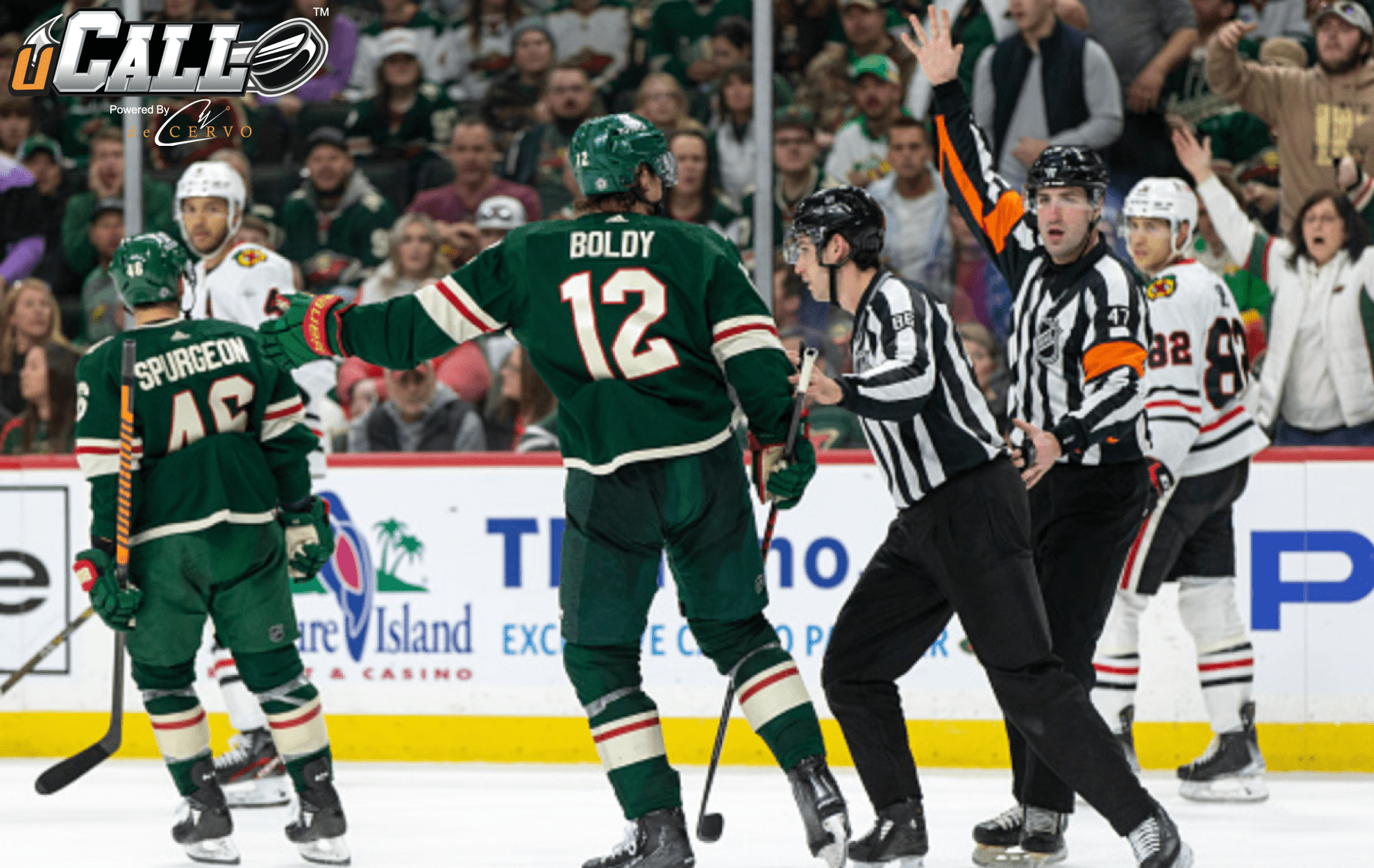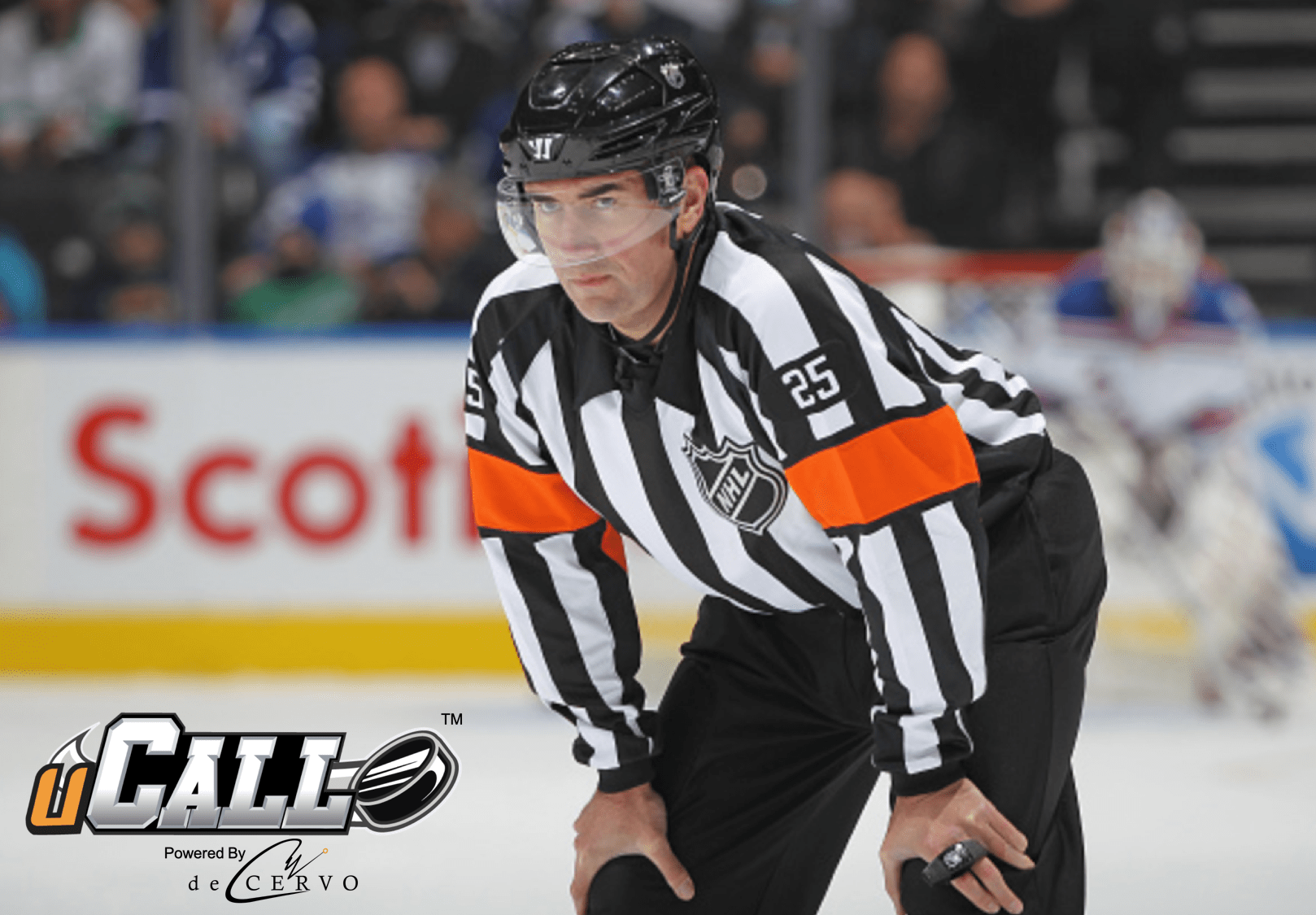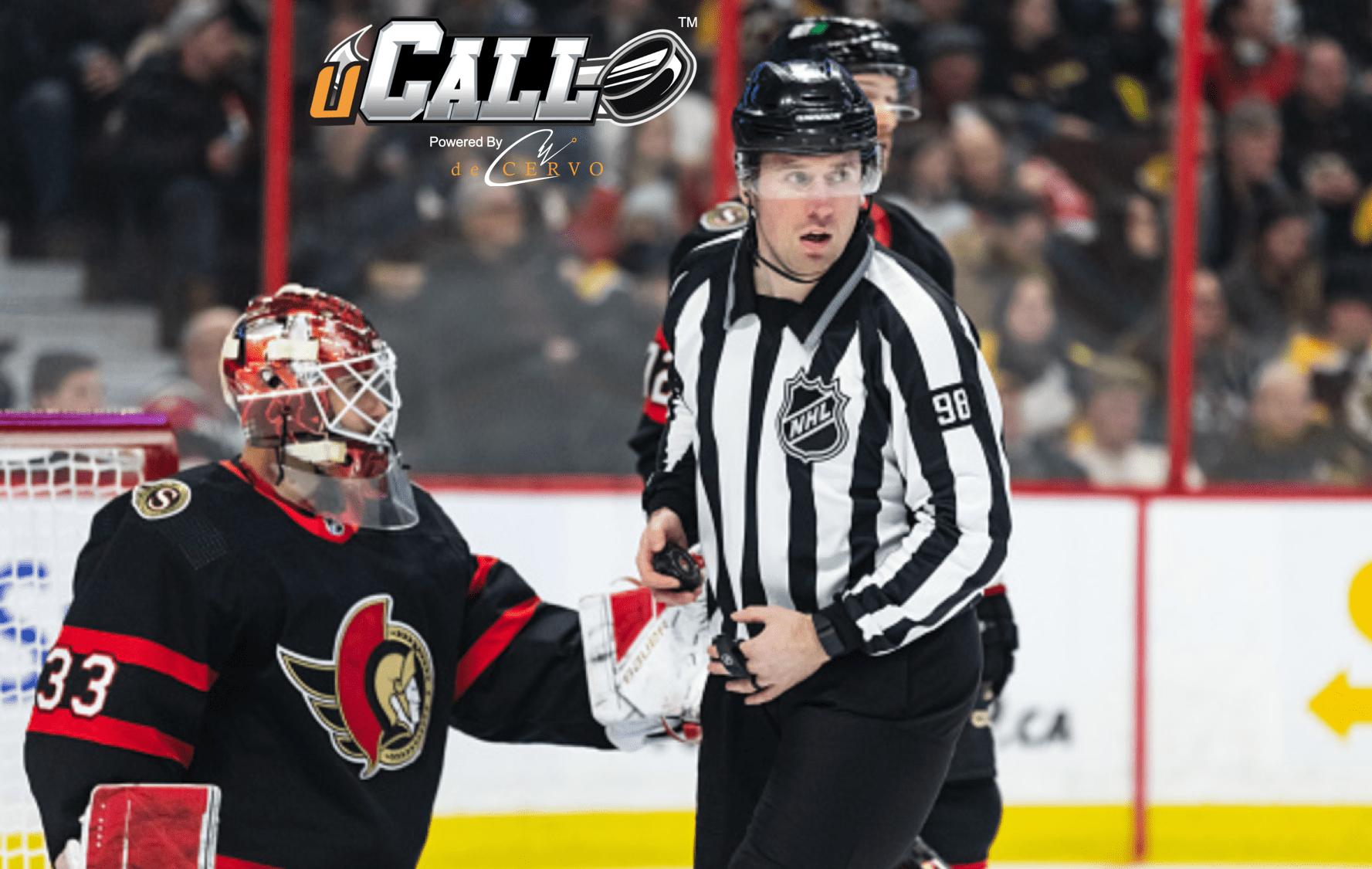Decision Training Case Study, Part 2
5 Promotions to NHL
A decision training case study in hockey
December 6, 2023
Accelerating Development of NHL Officials
Decision Training Case Study on 5 Promotions to NHL
The National Hockey League (NHL) wanted to accelerate the rate at which new officials can become referees and linesmen. As described in a previous post, NHL contracted deCervo to make a new decision training program to attack this problem. In this case study, we take a further look at five (5) officials who made the jump to the NHL in 2023-24 (see more here). This case study is about promotions to NHL officiating. But it is also about how our decision training program for hockey officials contributed to professional development. All five officials are uCALL alumni. They have totaled over 9,000 plays practiced in our software (see more about uCALL here and our decision training methods here). In this case study, we will look at the 5 officials’ paths from being American Hockey League (AHL) and/or East Coast Hockey League (ECHL) officials to being ready for the finest hockey league in the world, the NHL.
As is our practice with professional clients (see examples in baseball and elsewhere), we will anonymously refer to each person we worked with. We do this to protect their privacy. We also do this to illustrate that uCALL, like all of our products, are not for grading or evaluation. Rather, uCALL – and all deCervo products – are products for professional development and improvement.

Official #1
Official #1 is one of five officials who graduated to the NHL Officiating roster in 2023-24. He has worked over 200+ plays on uCALL. The 2023-24 season is his second season learning on-ice judgment with uCALL. In uCALL, all officials are rated based on their Ability Score. We will refer to it frequently in this study. From this example and others to follow, you will get a sense of how Ability Score changes as an official hones his judgment for play-calling. Official #1 began his uCALL career at an Ability Score (AS) of 0.19. By his 58th play in uCALL, he had maxed at 0.592.
This is the point at which uCALL started giving him harder calls to decide penalty (or not) for. As the plays got harder, his AS consistently declined. But he started learning penalty calls vs. no-calls at this higher level of difficulty. As he did so, uCALL’s internal learning algorithm automatically adjusted which plays he would call, matched to his evolving AS. And by his 82nd play, he had regained an AS maximum at 0.581. After this peak, consistently more difficult play-calls have come his way. As a result, at the start of this season, he is aiming to regain the AS peak he once hit. All the while, he will be learning the more subtle movements and play dynamics that characterize these harder play-calls in uCALL.

Official #2
Official #2 is another of the five officials who graduated to the NHL Officiating roster in 2023-24. He is the next example we examine for a decision training case study on promotions to NHL. He has worked an impressive 2900+ plays on uCALL. The 2023-24 season is his fifth season learning on-ice judgment with uCALL. Official #2 began his uCALL career at an Ability Score (AS) of 0.287. By his 72nd play in uCALL, he had hit his first maximum at 0.469.
This is the point for him when uCALL started giving him harder calls to decide on. As the plays got harder, his AS consistently declined. But he started learning penalty calls vs. no-calls at this higher level of difficulty, just like Official #1 had happen for him. uCALL automatically adjusted which plays he would see based on his evolving AS. And by his 386th play, he had learned enough penalty calls vs. no-calls to regain an AS maximum at 0.449.
After this peak, he got consistently more difficult play-calls have come his way. As a result, his next maximum came at the 516th play at an AS of 0.465. From there, through his 648th and most recent play (as of writing), he has either increased or maintained his AS. This plateau of the AS tells us that he has mastered nearly all of the plays in the uCALL curriculum. For this reason, every season of uCALL implementation has new plays added. And deCervo does this via its partnership with the National Hockey League to always provide fresh training curriculum.
Official #3
Official #3 is another of the five officials who graduated to the NHL Officiating roster in 2023-24. He is the next example we examine for a decision training case study on promotions to NHL. Overall, he shares more characteristics with Official #1 than #2. Like Official #1, he has worked hundreds of plays on uCALL, 480+ plays. The 2023-24 season is his second season learning on-ice judgment with uCALL. Official #3 began his uCALL career at an Ability Score (AS) of 0.496. By his 125th play in uCALL, he had hit his first maximum at 0.717.
This is the point for him when uCALL started giving him harder calls to decide. As the plays got harder, like for the other officials, his AS consistently declined. But he started learning penalty calls vs. no-calls at this higher level of difficulty. By his 176th play, he had regained an AS maximum at 0.663. This maximum was now at higher difficulty plays. After this peak, he got consistently more difficult play-calls in uCALL. And he is currently working through more difficult play-calls to regain one of these previous maxima.

Official #4
Official #4 is yet another of the five officials who graduated to the NHL Officiating roster in 2023-24. Like Official #2, he has worked uCALL plays in the thousands, 3200+ to be exact. The 2023-24 season is his fifth season learning judgment with uCALL. Official #4 began his uCALL career at an Ability Score (AS) of 0.323. By his 166th play in uCALL, he had hit his first maximum at 0.571.
As with the others, this is the point when uCALL started giving him harder calls. As the plays got harder, his AS consistently declined. But he started learning penalty calls vs. no-calls at this higher level of difficulty. By his 395th play, he had regained an AS maximum at 0.798. This showed us that he had learned how to make more sophisticated and nuanced penalty calls than during his previous maximum AS. This cycle repeated itself again by the 511th play with an AS of 0.775. Again, the cycle continued out to his 698th play, when he hit a maximum AS of 1.143. With each peak, we are sure that he has refined his penalty judgment with yet another layer of sophistication. As with Official #2, the repeat times seeing certain plays helped him learn the subtle cues he needs to recognize in real-time gameplay. As a result, this helped him, like Official #2, hit a high plateau of AS.
Official #5
Official #5 is the final of the five officials who graduated to the NHL Officiating roster in 2023-24. He is the final example we examine for a decision training case study on promotions to NHL. Like Officials #2 and #4, he has worked in the thousands of plays, 2200+ plays to be exact on uCALL. Impressively, the 2023-24 season is only his second season learning judgment with uCALL. Official #5 began his uCALL career at an Ability Score (AS) of 0.19. By his 152nd play in uCALL, he had hit his first maximum at 0.476.
This is the point for him when uCALL started giving him harder calls, like it did for others. As the plays got harder, his AS consistently declined. But he started learning penalty calls vs. no-calls at this higher level of difficulty. By his 310th play, he had regained an AS maximum at 0.494. As with other officials, this maximum showed us he had refined his judgment to a new standard. This cycle repeated itself again by the 511th play with an AS of 0.775. With every new peak, we are sure quantitatively that Official #5 has reached a new refinement of his judgment. Again, the cycle continued out to his 614th play, when he hit a maximum AS of 0.669. As with Officials #2 and #4, the repeat times seeing certain plays helped him learn the subtle cues he needs to recognize in real-time gameplay. As a result, this helped him, like the other officials, hit a high plateau of AS.
Bottom Line
Officials #1-5 all graduated to the NHL Officiating roster in 2023-24. All were uCALL alumni. It is the first time since NHL began using uCALL that all new-hires had developed with uCALL. Some were more practiced than others. The differences in their paths shows us the ways that decision training can vary by each person. Particularly, this case study on promotions to NHL show how varied the specific paths can be for a given official. Still, the consistent theme we saw in all was peak AS followed by uCALL adjusting the play difficulty to help them learn more nuanced play-calls.
Some officials (#2, #4 and #5) have worked so many plays that they have learned from previous mistakes to coalesce their skills into high AS at high difficulty play-calls. Others (#1 and #3) are still working through the more difficult plays. But they have already shown multiple peaks in AS, displaying their nascent mastery of the NHL Standard for Officiating. We are extremely proud of these five uCALL alumni. Their last 2-5 years of work training this skill have paid off. Best wishes to a successful NHL career!

